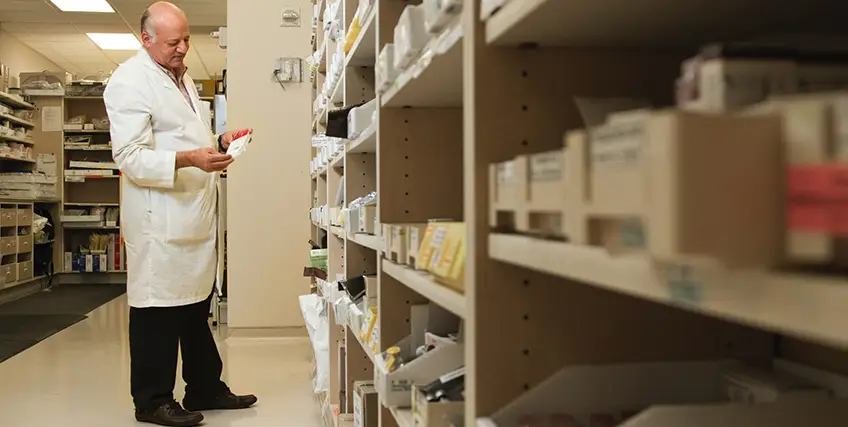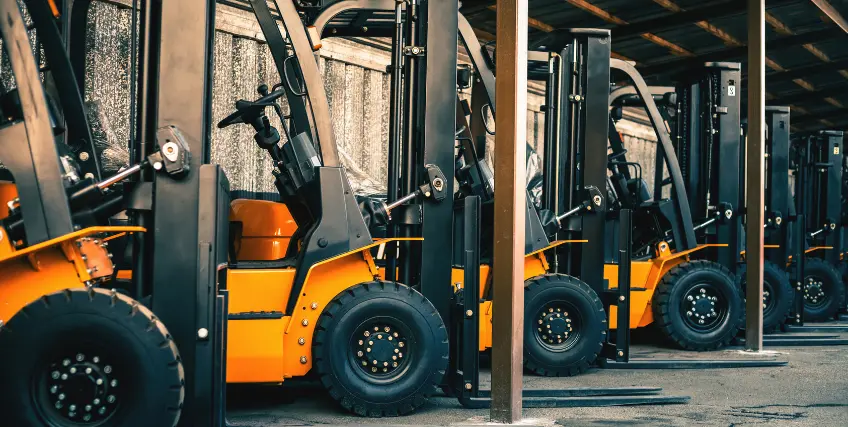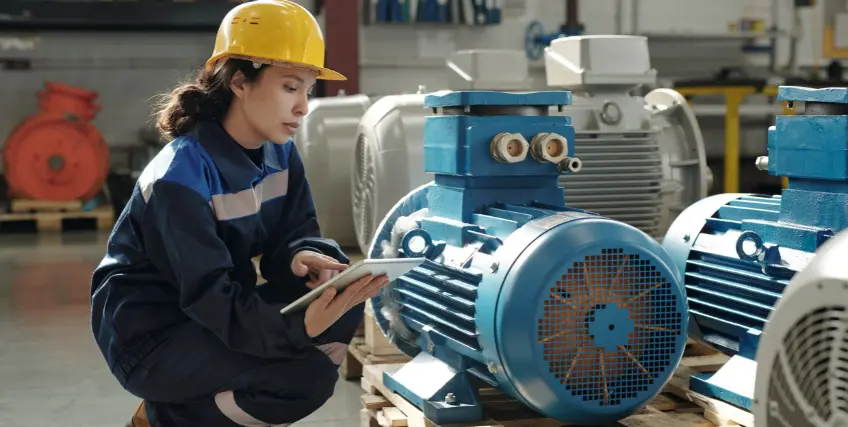Easy Equipment Financing for Small Businesses
December 27, 2024 | Last Updated on: December 27, 2024

Small businesses that depend on machinery, equipment, or vehicles for their day-to-day operations often require an equipment finance loan to meet those needs.
Thankfully, many small business owners find that getting equipment financing is one of the easiest types of funding available to them—even if they are startups.
In this article, we’ll show you how to get the easy equipment financing your business needs.
What is an equipment finance loan?
An equipment finance loan is a type of financing used to purchase essential equipment for a business. This can include but is not limited to:
- computer equipment
- construction equipment
- medical equipment
- heavy machinery
- commercial vehicles
- commercial kitchen equipment and furnishings
Business equipment can be expensive, and many small business owners don’t have the cash flow available to purchase what they need outright, making it necessary to seek an equipment loan.
Is it hard to get equipment financing?
An equipment loan is generally easier to get than some other types of small business loans. This is because the equipment becomes collateral for the loan, meaning if a business owner defaults on the loan, the lender can recover the equipment to help offset the loss of loan revenue.
You can get an equipment loan from banks and traditional lenders, or from alternative lenders. Traditional lenders often offer better repayment terms, but the loan application process can be cumbersome. This is especially the case when you have your hands full running your business.
Alternative lenders specialize in easy equipment financing. Online lenders and small business loan marketplaces are considered alternative lenders. With alternative lenders, the underwriting and loan application process is usually more streamlined, but interest rates may be higher.
How do equipment and machinery finance loans work?
Eligibility criteria and loan terms for equipment financing loans will vary from one lender to another, and the interest rate you’ll pay will vary depending on the following factors:
Your credit score
In general, the stronger your credit score, the better. While some lenders will be more lenient about your credit score with equipment loans, it’s important to note that even if a lender finds a lower credit score acceptable, it will usually mean a higher interest rate.
The lender’s criteria
Every lender has its own underwriting requirements. Traditional lenders tend to be stricter, while alternative lenders are more relaxed in requirements. You may also consider an SBA loan. These loans are backed by the Small Business Administration, making them less risky for banks. As a result, you can get better terms, but the application process can be more complicated.
The type of equipment or machinery
The type of equipment plays a role in equipment financing interest rates because depreciation is faster in some types of equipment. A lender might charge a higher interest rate or have shorter loan terms on a loan for equipment that doesn’t hold value for very long. Some financial providers will also require a higher down payment in cases like this.
Loan-to-value ratio (LTV)
Many secured loans factor in the LTV of an asset when evaluating a loan. This is the proportion of an equipment’s value that the lender will offer financing against. The LTV ratio is calculated by taking the loan amount and dividing it by the equipment’s value. When calculating LTV, the lower the number the better.
Down payment
Many lenders also require a down payment on equipment loans. Down payment requirements typically run between 10% and 30% of the total cost of the equipment. The higher the down payment, the more competitive rates you’ll likely receive for your equipment loan. In some cases, equipment can be financed up to 100 percent of its value.
Business equipment financing benefits
The benefits of equipment financing are numerous for business owners. The main benefit is getting the equipment you need to run your company and increase efficiency.
But there are other benefits as well, including:
Equipment financing helps preserve cash flow
A business owner may find an urgent need to purchase business equipment at any time. Most business owners prefer not to disrupt their company’s cash flow to fund the purchase of equipment if they can avoid it. This keeps working capital in reserve for ongoing business expenses.
Easy equipment financing has predictable payments
With most equipment loans, your terms include predictable monthly payments that allow you to stick to a budget and easily pay for your equipment over time.
Financing equipment means you own your equipment instead of having to lease it
Many small business owners prefer to own their business equipment rather than go the route of equipment leasing. That way when they’re ready for an upgrade, they can recapture some of the value by reselling. Financing your equipment and breaking down the payment affords you this opportunity.
Equipment financing helps build your business credit
During the time you own your business, you’ll likely need several small business loans. Getting easy equipment financing and paying off the loan on time will help your business build its credit history and get favorable loan terms on future business financing.
Equipment loans are easy to get and have better terms
Compared to other small business loans, equipment financing is easy to get. Lenders won’t usually dig deep to have you provide more collateral than the equipment. Plus, you’ll usually get funded faster, particularly with an online lender. Online lenders also have the added advantage of an online application process.
How to get easy equipment financing
You’ll have an easier time getting approved for an equipment finance loan when you consider the following.
- Meet the lender’s criteria for time in business. Most lenders prefer loaning money to businesses that have been in business for at least 18 to 24 months. If you want fast and easy funding, you may need to wait until you’ve hit this milestone.
- Avoid high-risk sectors. Higher-risk sectors such as construction, retail, or restaurant businesses might experience more difficulty getting fast funding than a successful medical office practice wanting to buy medical equipment or a multi-residential apartment complex with high occupancy rates and little turnover. That said, many businesses can get easy equipment financing through an online loan broker. A reputable online lending marketplace can help you through the process and improve your odds of approval.
- Have a good business plan and your financials in order. One of the key things a lender will want to review is a business plan and financial documents, including your profit and cash flow statements and balance sheets. Most lenders prefer to loan to businesses with proven annual revenue. Have your financial statements ready to disclose to lenders. The more prepared you are, the more impressed a lender will be that you’ve done your due diligence.
- Maximize your down payment. Consider maximizing your down payment to make the loan application process easier and quicker. Lenders appreciate borrowers who are just as invested in their business equipment. When you’re willing to put more down on your equipment purchase, it shows the lender that you’re serious and committed. Consider using personal savings or personal credit cards if need be, to increase your down payment.
What if I have bad credit?
As previously discussed, your credit score is an important factor in qualifying for easy equipment financing. Before applying for an equipment loan, get a copy of your credit record to know what you’re up against.
If your score is low and you have time to wait, try to bring up your score before applying for easier and faster approval and good loan terms. If you have late credit card payments or other negative items on your credit record, get a few good payments in so your most recent credit history is positive. Dispute anything on your credit report that’s incorrect.
Remember that some online lenders aren’t as strict about credit scores and may approve your loan but at a higher interest rate. You can use an easy equipment finance loan as a steppingstone towards better loans in the future.
FAQs
Why should I apply for easy equipment financing?
An equipment loan can help replace aging equipment to improve the operations of your business, upgrade existing equipment, or buy new equipment for a new business. Easy equipment financing is a good option when time is of the essence, and you need new equipment as soon as possible.
Are there risks with an equipment loan?
The primary risk associated with an equipment loan is that the lender can repossess the equipment if you default on the loan. This could severely impact your business’s operations, although most small business owners realize this risk and are careful to repay their loans on time. Another risk is that the equipment can become obsolete too soon if the equipment you use is replaced by a more innovative piece of equipment.
How long will I have to repay my equipment loan?
This will strongly hinge on the useful life of the equipment. For example, if you purchase equipment that isn’t expected to last beyond four years, a lender likely won’t go beyond that since the equipment is collateral for the loan.
Are there other ways I can buy business equipment besides an equipment loan?
Yes, many small business owners have an open business line of credit to draw from for larger business expenses including equipment. Other financing options are credit cards, a term loan, SBA financing, or revenue-based financing.
What’s the best way to get easy equipment financing?
This ultimately depends on your business needs. Online business loan brokers and marketplaces tend to have more flexible financing solutions than traditional lenders. Many small business owners think online lenders are the best way to get equipment financing as they may have more flexible terms and easier payment plans.
Frequent searches leading to this page
easy equipment financing, business equipment financing benefits, equipment finance loan, machinery finance




